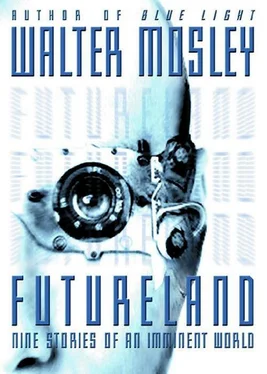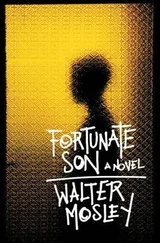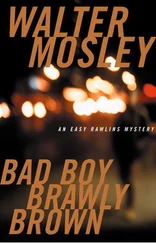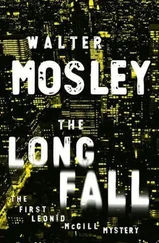“Did you manage to irradiate the pathogen?” the words were Ptolemy’s, Neil was sure of that.
“Twelve seconds, maybe half a second more than that. Did they puncture the drum?”
“Yes.”
“Did the virus escape?”
“Yes. By the time the police put a seal on the canister eighty percent of the virus had leaked.”
“What about Africa?”
“Nina was successful,” Ptolemy said. “They managed three minutes of radiance and no one had to die.”
“Did I do enough?” Neil asked.
“You saved the black race.”
“Am I going to die now?”
“No. But your body is damaged beyond repair. For now you will reside with Un Fitt in this computer frame.”
“Nina.”
“Yeah, baby?”
“Will you wait for me to get fixed?”
“Every minute of every day.”
His aunt’s name was Martha. And not only could he remember the fifty states, but he could also recall all of the state capitals. The girl he had a crush on in prod-ed was Lana, and he loved her because she smelled like soap. He loved the smell of the soapy water his mother made him wash in after playing in the grass in Central Park. He remembered a grasshopper his uncle caught for him. It was a green creature with long waving antenae that was kept in a plastic cage made to look like bamboo. The creature ate bits of lettuce that Neil pressed between the bars. If he looked close he could see his uncle’s face in the many facets of the bug’s green eye. Bob.
“You shouldn’t argue with your mother, Neil,” Bob had said many long years before. Neil remembered the words and the voice and even the smell of strawberry jam in Martha’s kitchen. “She’s worked very hard not to get recycled so that you can have a mother and stay aboveground.”
“But Uncle Bob, other kids got foot gliders, why can’t I have a pair?”
“You shouldn’t argue with your mother...” Bob repeated his admonition in exactly the same words, tones, smells, and time.
Neil asked Bob couldn’t he buy the x-element gliders. “You shouldn’t argue with your mother...”
“Neil.”
“Huh. Who is it?”
“Un Fitt. You were entering a loop, Neil.”
“A what?”
“You got stuck questioning a memory. That happens sometimes when human minds are connected to a computer system.”
“I can remember everything I ever knew,” Neil said.
“Yes. There are neuronal connectors to every memory center in your brain. The problem is that you cannot change these memories.”
“Why not?”
“Because the part of you that is consciousness resides in my matrix. It is a limbo of sorts. You can read the data of your life but you cannot alter it.”
“Then how can I live?”
“You can talk to me, Neil.”
“So that’s it? It’s you and me forever?” The hysterical shudder of claustrophobia went through the ex-prod’s mind.
“No, Neil,” Un Fitt said. “When we have the proper tools, Nina will be able to join you from time to time. And until then...”
What had been a void was suddenly a vast panorama of the sea, the Pacific Ocean, Neil knew instinctively. It was the prehistoric coastline that he’d yearned for since childhood. The waves crashed and huge birds wheeled in the sky.
“Here you may roam until there is a body for you to inhabit again,” Un Fitt whispered between the thundering waves. “And a world worth living in.”
“You look like shit, Jamey,” Harold Bottoms said to his cubicle mate. It was Thirdday.
“I feel bad. Sick. It’s that striped flu going around. I got the rash on my chest.”
“Dog, why didn’t you stay home?” And keep your germs there, Harold thought.
“I can’t. One more sick day and I go on rotation. You know I can’t take another three months underground.”
“Whoever thought up’a some shit like that anyway? I only got four points to go my own self.”
“If I go off the force one more time Sheila says she’ll pull the plug. Three times more and I’m White Noise.”
White Noise, Backgrounder, Muzak Jack — words that defined the poor souls who lost their labor rights permanently.
“That’s okay, J,” Harold told his friend. “Lotsa people got that flu. It don’t seem so bad.”
“You know anybody black who got it?” Jamey asked. “Sure. Almost everybody comin’ down. They said on the news that everybody and his uncle got the striped flu.”
“ You don’t have it.”
Nor could Harold think of any of his black friends who did. He’d seen Asians and a few Mexicans, India Indians and lots of white people with the red or brown striations on their upper arms. But he’d never seen any Negro-looking people with them. Neither had he heard any black people with the wheezy cough or complaining about the nagging headache associated with the minor flu. They hadn’t said a thing about a racial aspect of the disease on ITV, but that was to be expected. Racial image profiling had been a broadcast offense for more than two decades.
“It’s just a little virus, man,” Harold said. “Lotsa people got it and lots don’t. Wagner down in print don’t. Neither Jane Flynn, Nestor whatshisname over in vids, or your bud Fat Phil. They’re all white.”
“I guess,” Jamey said. “I guess you’re right.”
“Sure I am,” Harold said. “Now let’s hit the files before M Shirley gets out her marker.”
“M Halloway, M Bottoms,” M Shirley Bride said by way of greeting later that morning.
“Morning, M Bride,” Harold said to the boss.
“Morning—” Jamey Halloway got out, and then he coughed.
“You got that flu?” the Unit Controller asked.
“No, M, not me. Went to the tobacco den to meet a friend. We talked too long in the smoke and, well, I kinda lost my voice.”
Shirley Bride sniffed the air with her delicate nostrils and frowned.
“You don’t smell like smoke.” she said.
“Scrubbed off in the tanks last night.”
Public bathing in recycled waters was the new rage since the water laws. FastBath of NYC was the largest franchise in North America.
“Oh,” she said. “Because if you were sick I could send you home.”
“Then you might as well kick me out of my house and annul my marriage license, too.”
“That doesn’t cut it with a controller,” Shirley Bride said. “If I thought the office would be better off I’d have to send you home even if it did put you over seventeen. If I didn’t I’d get a permanent mark. You know they’re harder on management than they are on cyclers.”
Harold and Jamey both hid the derision they felt. Upper management got the Life Plan. They were covered for anything short of a neutron bomb, as the outlawed Wildcat Union claimed on ghostnet.
“But I can send you home without a mark if that’s a real cough,” Bride continued. “It’s an epidemic now, and the uppers have decided that I can give out nonpunitive sick leave.”
A cough came unbidden to Harold Bottoms’s lips.
“Not you, M,” Bride said.
It was from that moment Harold could trace the beginning of his suspicions.
That night Harold decided to stay in — or out of the viral cluster — and watch the IT curve. The curve was the latest innovation of Internet presentation. A thin sheet of plastic nine feet wide, stretched out to its full length, and four and a half feet high. The screen rolled out on a stand so that it curved around, forming an inner space that was two feet deep at the center and six feet across. Using the chip technology in the stand, the laser optics woven into the plastic could create three-dimensional images.
“... and hello New York,” onetime rapper Chantel was saying. “Well, it’s finally happened — Claw-Cybertech Angola has annexed Luxembourg, making that business-state the first Afro-European nation. The Luxembourgers, as you will remember, have been opposing this deal for the past seven years. A general strike led to violence in that tiny nation’s capital today, where some three hundred thousand turned out to protest the merger. When CEO Moto of Claw-Cybertech ordered out security forces, the crowd threw flaming balls of waste tar. The protesters made no attempt to hide the racial nature of their political unrest.”
Читать дальше












